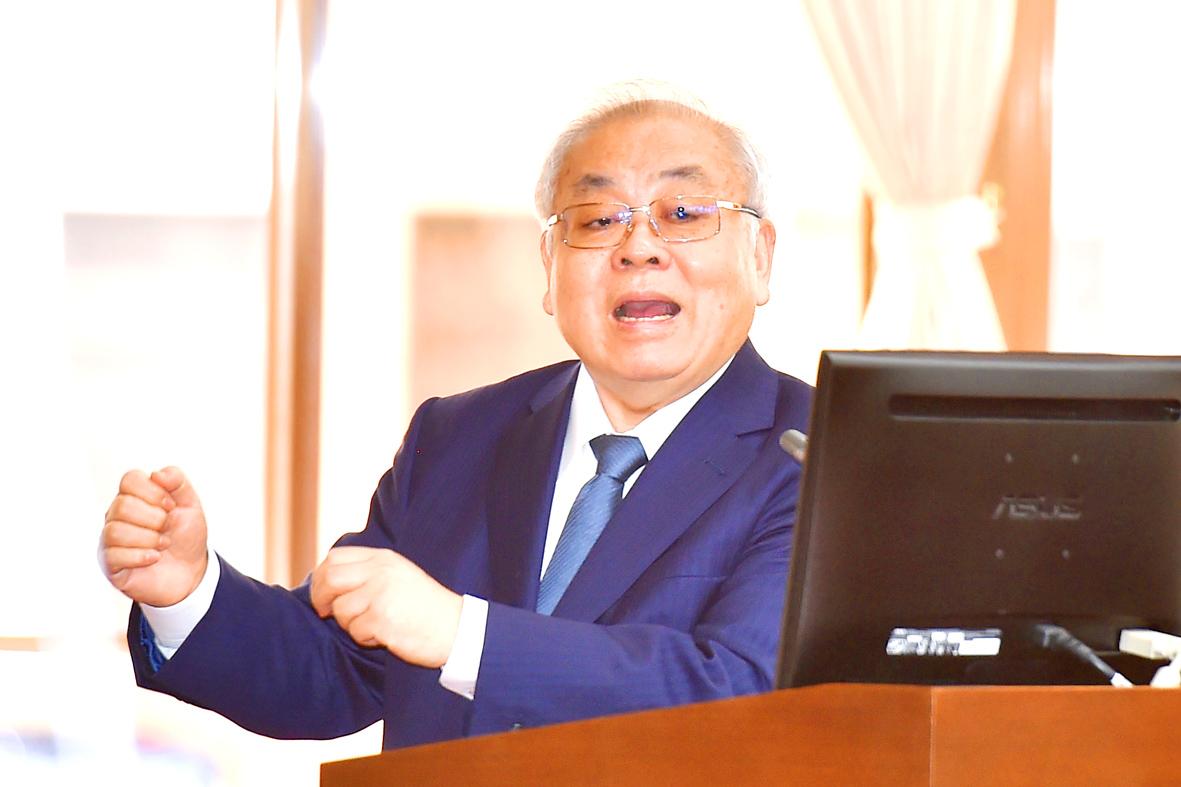Government officials yesterday dismissed an IMF forecast that Taiwan’s GDP would contract by 4 percent this year, saying that the nation’s economy would continue to grow by 1.3 to 1.8 percent.
Directorate-General of Budget, Accounting and Statistics (DGBAS) Minister Chu Tzer-ming (朱澤民) made the assertion one day after the IMF released its World Economic Outlook report, which forecast that Taiwan’s GDP would decline amid a global recession.
“There is no need to take the [IMF] forecast seriously, as the international research body has failed to factor in the government’s NT$1.05 trillion [US$34.96 billion] program to mitigate the effects of the [COVID-19] pandemic,” Chu told reporters.

Photo: Tu Chien-jung, Taipei Times
The IMF also does not have the latest figures on Taiwan’s economic performance, as the DGBAS is to disclose first-quarter figures on April 30, he said.
The economy would remain in expansion mode this year, with growth of 1.3 to 1.8 percent, nearly 50 percent less than the agency’s prediction in February of 2.37 percent, he added.
The landscape has deteriorated significantly following the spread of the novel coronavirus across Europe and the US, leading governments worldwide to introduce travel restrictions and shut down non-essential businesses, Chu said.
Taiwan is susceptible to reduced global trade flows, but has been resilient thanks to a low number of infections, diminished dependence on Chinese tourists and the government’s quick response, he said.
The National Development Council said the IMF forecast reflected a lack of understanding of the nation’s economic situation.
The impact of the pandemic on the Taiwanese economy is much more controllable than in other Asian countries, because Taiwan has managed to minimize infections without invoking draconian isolation measures, the council said.
Manufacturing companies in Taiwan have maintained normal operations and a considerable number have reported order transfers from peers trapped by lockdowns elsewhere, it said.
Excluding special loans, relief and stimulus measures are to total NT$350 billion this year, accounting for 1.8 percent of GDP, that would help keep the economy growing and outperforming major trade rivals, as well as the regional and global average, the council said, adding that it would make sure budgets for public works are executed effectively.
Major economic data lent support to the government’s argument.
Exports in the first quarter expanded 3.7 percent, while imports increased 3.5 percent, faster than official projections of 2.19 percent and 1.85 percent respectively.
The IMF forecast that the world economy would contract by 3 percent this year, induced in part by concerted government efforts to combat the pandemic, before rebounding by 5.8 percent next year.
This story has been corrected since it was first published, which incorrectly stated in the fourth paragraph from the bottom that "Special loans as well as relief and stimulus measures are to total NT$350 billion this year." The online version of this story has been corrected into that "Excluding special loans, relief and stimulus measures are to total NT$350 billion this year."

In Italy’s storied gold-making hubs, jewelers are reworking their designs to trim gold content as they race to blunt the effect of record prices and appeal to shoppers watching their budgets. Gold prices hit a record high on Thursday, surging near US$5,600 an ounce, more than double a year ago as geopolitical concerns and jitters over trade pushed investors toward the safe-haven asset. The rally is putting undue pressure on small artisans as they face mounting demands from customers, including international brands, to produce cheaper items, from signature pieces to wedding rings, according to interviews with four independent jewelers in Italy’s main

Japanese Prime Minister Sanae Takaichi has talked up the benefits of a weaker yen in a campaign speech, adopting a tone at odds with her finance ministry, which has refused to rule out any options to counter excessive foreign exchange volatility. Takaichi later softened her stance, saying she did not have a preference for the yen’s direction. “People say the weak yen is bad right now, but for export industries, it’s a major opportunity,” Takaichi said on Saturday at a rally for Liberal Democratic Party candidate Daishiro Yamagiwa in Kanagawa Prefecture ahead of a snap election on Sunday. “Whether it’s selling food or

CONCERNS: Tech companies investing in AI businesses that purchase their products have raised questions among investors that they are artificially propping up demand Nvidia Corp chief executive officer Jensen Huang (黃仁勳) on Saturday said that the company would be participating in OpenAI’s latest funding round, describing it as potentially “the largest investment we’ve ever made.” “We will invest a great deal of money,” Huang told reporters while visiting Taipei. “I believe in OpenAI. The work that they do is incredible. They’re one of the most consequential companies of our time.” Huang did not say exactly how much Nvidia might contribute, but described the investment as “huge.” “Let Sam announce how much he’s going to raise — it’s for him to decide,” Huang said, referring to OpenAI

The global server market is expected to grow 12.8 percent annually this year, with artificial intelligence (AI) servers projected to account for 16.5 percent, driven by continued investment in AI infrastructure by major cloud service providers (CSPs), market researcher TrendForce Corp (集邦科技) said yesterday. Global AI server shipments this year are expected to increase 28 percent year-on-year to more than 2.7 million units, driven by sustained demand from CSPs and government sovereign cloud projects, TrendForce analyst Frank Kung (龔明德) told the Taipei Times. Demand for GPU-based AI servers, including Nvidia Corp’s GB and Vera Rubin rack systems, is expected to remain high,